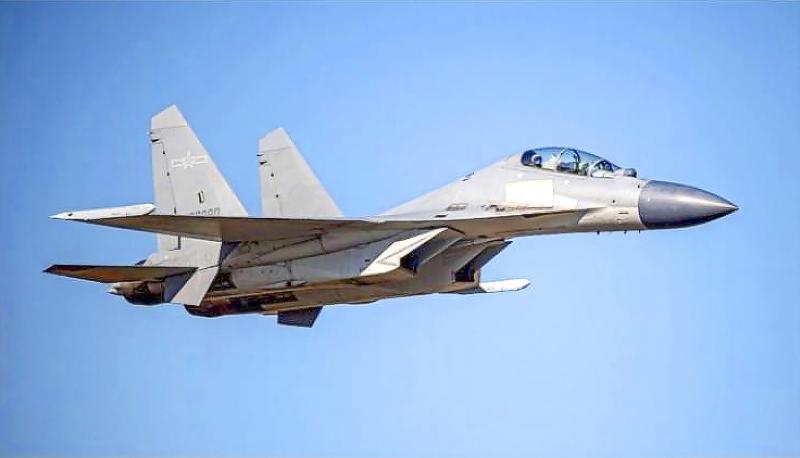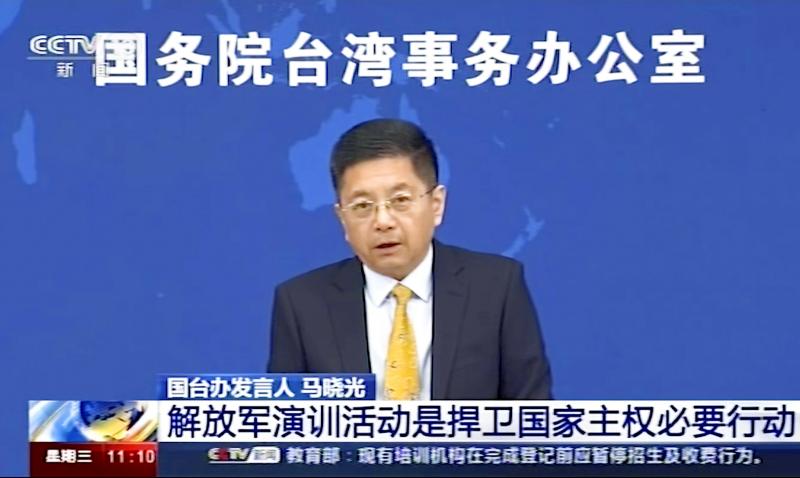China’s recent increase in military exercises and warplane missions near Taiwan was necessary to defend sovereignty and territory, a Chinese official said yesterday, prompting Taipei to say that it had sabotaged peace and stability across the Taiwan Strait.
China’s military flew 56 planes off the southwest coast of Taiwan on a single day earlier this month, a single-day record that capped four days of a sustained pressure campaign involving 149 flights in international airspace.
The purpose of the maneuvers was to “fundamentally safeguard the overall interests of the Chinese nation and the vital interests of people on both sides of the Taiwan Strait,” China’s Taiwan Affairs Office spokesman Ma Xiaoguang (馬曉光) said, without specifying a threat.

Photo: AP
“The People’s Liberation Army exercises are necessary actions to defend [Chinese] national sovereignty and territorial integrity,” Ma told reporters at a biweekly news conference in Beijing.
In Taipei, Ministry of Foreign Affairs spokeswoman Joanne Ou (歐江安) said that China has sabotaged peace and stability across the Taiwan Strait with its military provocation, diplomatic coercion and economic pressure against Taiwan.
Chinese aggression has also sparked concerns from the US and other partners of Taiwan, highlighting the importance of the nation’s security and its strategic role in the international community, Ou said in a statement.

Photo: AP
Taiwan will continue to defend the peace and stability in the Taiwan Strait and the Indo-Pacific region, bolster its self-defense capabilities, and protect its freedom and democratic institutions, she said.
Over the past few days, several high-ranking US officials have urged Beijing to stop coercing Taiwan with military force, while reaffirming Washington’s commitment to Taiwan as “rock solid,” Ou said, thanking Washington for its support.
In a talk this week with journalists, political scientist Shelley Rigger said that while the cross-strait situation seemed more intense, it was more likely being used as a deterrent.
China is “trying to deter Taiwan from imagining that there is some kind of opportunity to make a change in its own position and also trying to deter the US from providing support or creating the impression in Taiwan that this might be a moment for Taiwan to push the envelope harder,” said Rigger, a longtime observer of Taiwanese politics at Davidson College in North Carolina.
“I also think that there is an element of the PLA [People’s Liberation Army] kind of testing its own operational capabilities, and so it’s kind of killing two birds with one stone,” Rigger said. “You’re sending a strong message to Taiwan and to the US, and you’re also getting a lot of flight hours at a minimum for your military personnel.”
Additional reporting by Lin Chia-nan

CHAOS: Iranians took to the streets playing celebratory music after reports of Khamenei’s death on Saturday, while mourners also gathered in Tehran yesterday Iranian Supreme Leader Ayatollah Ali Khamenei was killed in a major attack on Iran launched by Israel and the US, throwing the future of the Islamic republic into doubt and raising the risk of regional instability. Iranian state television and the state-run IRNA news agency announced the 86-year-old’s death early yesterday. US President Donald Trump said it gave Iranians their “greatest chance” to “take back” their country. The announcements came after a joint US and Israeli aerial bombardment that targeted Iranian military and governmental sites. Trump said the “heavy and pinpoint bombing” would continue through the week or as long

TRUST: The KMT said it respected the US’ timing and considerations, and hoped it would continue to honor its commitments to helping Taiwan bolster its defenses and deterrence US President Donald Trump is delaying a multibillion-dollar arms sale to Taiwan to ensure his visit to Beijing is successful, a New York Times report said. The weapons sales package has stalled in the US Department of State, the report said, citing US officials it did not identify. The White House has told agencies not to push forward ahead of Trump’s meeting with Chinese President Xi Jinping (習近平), it said. The two last month held a phone call to discuss trade and geopolitical flashpoints ahead of the summit. Xi raised the Taiwan issue and urged the US to handle arms sales to

BIG SPENDERS: Foreign investors bought the most Taiwan equities since 2005, signaling confidence that an AI boom would continue to benefit chipmakers Taiwan Semiconductor Manufacturing Co’s (TSMC, 台積電) market capitalization swelled to US$2 trillion for the first time following a 4.25 percent rally in its American depositary receipts (ADR) overnight, putting the world’s biggest contract chipmaker sixth on the list of the world’s biggest companies by market capitalization, just behind Amazon.com Inc. The site CompaniesMarketcap.com ranked TSMC ahead of Saudi Aramco and Meta Platforms Inc. The Taiwanese company’s ADRs on Tuesday surged to US$385.75 on the New York Stock Exchange, as strong demand for artificial intelligence (AI) applications led to chip supply constraints and boost revenue growth to record-breaking levels. Each TSMC ADR represents

State-run CPC Corp, Taiwan (CPC, 台灣中油) yesterday said that it had confirmed on Saturday night with its liquefied natural gas (LNG) and crude oil suppliers that shipments are proceeding as scheduled and that domestic supplies remain unaffected. The CPC yesterday announced the gasoline and diesel prices will rise by NT$0.2 and NT$0.4 per liter, respectively, starting Monday, citing Middle East tensions and blizzards in the eastern United States. CPC also iterated it has been reducing the proportion of crude oil imports from the Middle East and diversifying its supply sources in the past few years in response to geopolitical risks, expanding